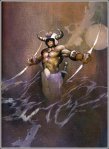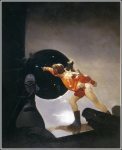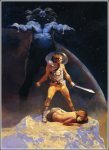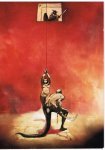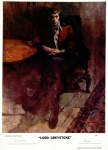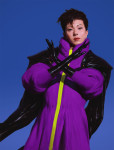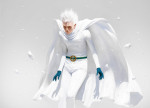Rick Wayne's Blog, page 21
May 18, 2020
(Art) The Stunning Characters of Face Zero
May 15, 2020
(Fiction) Reversals
[image error]
Del was right. Everywhere Nio might want to go was only five minutes away. Raffe’s Day and Night was a further ten outside town. The sky darkened completely on the drive. The last glow in the west faded and the clouds obscured the stars. Other than the occasional distant car or porch lamp, the blinking red lights of the deep core miner was all Nio could see.
The self-driving sedan wasn’t stock. It was a custom Maybach, a luxury vehicle unlike any Nio had seen. The leather was plush. Both buckets seats in the back reclined and had their own screens. The on-board computer announced their ETA every few minutes. It was meant to be helpful. To Nio, it seemed like a countdown. With a final satisfied ding, the vehicle pulled into a crumbling asphalt lot behind a tall windowless bar at the corner of a state highway and a numbered county road. The neon sign on the pole out front was missing several letters.
“Out,” Dalrymple ordered.
Enough salt had been poured onto the nearly-empty lot that little remained of the snow. At the back was a dilapidated fence separating the lot from the cluster of unmarked camping trailers in the field beyond. Trees bordered them on two sides. A four-foot gap between fence poles connected the bar with the trailers. The path between was worn to dirt.
A bouncer in a suit coat and turtleneck came out to greet them. He looked like a parody of himself. He even had slicked-back hair. He opened the door for Nio and held out his hand like she was a celebrity stepping onto the red carpet. Truly and her blue skin walked quickly inside. Dalrymple took up the rear.
Nio was wanded. The paddlelike device chirped over her boots.
“Take them off,” Dalrymple ordered.
She looked down at the slushy, wet gravel under her feet. “Seriously?”
“Nothing wired,” he told her.
“They’re not powered. It’s just stupid smart clothes circuitry. I’ve never connected them to anything.”
“They can store data. Take them off and throw them in the dumpster.” He nodded to the solid steel behemoth resting obliquely in its own wooden cage at the back of the bar. It smelled like a landfill.
On one hand, it was ridiculous. On the other, Nio had to admit, some kinds of “smart clothes” recorded enough information about their environment that they could be useful for law enforcement. There was no way to know, which meant the simplest rule was to ban them all.
She slipped off her unlaced boots and tossed them one at a time into the dumpster. They resounded off the metal wall. Her socks were soaked instantly. Tiny pebbles poked her feet. She felt so much smaller.
The solid steel double doors were opened and Nio was pushed into a large square storage room weakly lit by fluorescent lamp. The walls were painted seafoam, which gave everything a sickly look, including the rack of plastic-wrapped sex dolls that took up most of the left wall. Despite that most of their proportions were ridiculous, some of them looked completely real. Nio wasn’t sure she would be able to tell if one of the twenty or so leaning figures had been a real body.
The doorway at the other end of the room led to a hall paneled in faux wood. The open floor of the club was at the far end. Music thumped. The doorway to the kitchen opened on the left. A large-bosomed waitress dressed like a sexy referee walked out carrying food in a plastic basket. Halfway between the kitchen and the storage room, a staircase broke off to the right. It was short, not quite tall enough to lead to a second floor. At the top, past the closed door, was a dim, low office overlooking the interior of the high-ceilinged strip club. The far wall was entirely made of tinted, floor-to-ceiling glass. On the right was a large desk facing two chairs. Truly waited in one, positively glowing blue in the UV light from the stage. Her tail flicked out the back of the chair. On the left was a leather sofa and a short hall to a private washroom. By the light under the door, it was apparently occupied.
“Have a seat,” Dalrymple ordered. His head nearly touched the low ceiling.
Nio strolled to the couch. The walls of the office were covered in framed pictures, none more than eight or nine inches across. Most held pictures of smiling patrons. They recounted the entire 90-year history of the establishment, which used to be called The Day Club, then The Day and Night, now Raffe’s Day and Night. Apparently, it had been perpetually popular with hunters.
Hanging on the wall behind the desk, occupying the place of honor, was a girl-sized bright pink Hello Kitty shotgun. Nio stared. It was ridiculously out of place.
“Pheasant,” a woman said.
Her voice had a country accent, but the pitch was too high. Nio turned. A little person with fake boobs and permed blonde hair stepped out of the washroom. She looked to be in her 50s. She was barely three and a half feet tall.
“The shot gun,” she explained. She passed too quickly for Nio to get a read. “It’s for hunting pheasant. It was a gift from an old client of mine. In my day, we had exactly two industries: Sturgis and the pheasant run. A girl had to make her year working those. I’m Raffela. And you are?”
“A kidnapping lawsuit.”
“She didn’t have any ID, boss,” Dalrymple said. “Just the phone.” He handed it to her.
Raffela took it with her to her desk, where she stepped up a kind of footstool to her chair.
“Where’s the kid?” she asked.
“Downstairs.”
“Get him up here.”
Dalrymple nodded and poked his head out the office door.
Raffela stood elevated behind her desk and shook her head at Truly, who fidgeted in the chair. Her tail twitched like a cat’s.
“Darlin’, we were so worried. Couple more days and we woulda had no choice but to call the police. What were you thinkin’?”
“I don’t know,” she said, clearly nervous.
“You could get into a lot of trouble, holding someone against their will like that. Whatever you two were arguing about, boys or whatever, I guarantee it wasn’t worth it.”
“Yes, ma’am,” Truly breathed.
There was a knock on the door.
“Come!” Raffe called.
A teenager in tight jeans entered sheepishly. He was skinny. He looked Southeast Asian. His finely coiffed hair curled over his head like a breaking wave.
“Have a seat,” Raffe said. She waited for him to comply. “Did you know about this?”
The kid looked to Truly like he wasn’t sure what he was supposed to say.
“It’s not his fault,” she said.
“Quiet.” Raffe waited for the kid. “Well?”
“The sequence musta been bad.”
“Where’d you get it?”
“Off the mod boards.”
Raffela made tsk-tsk sounds. “Now Guillermo, why would you do something dangerous like that?”
“I scanned it,” he protested. “I don’t know what happened.”
“What did you use?” Nio asked from the couch.
“Kitkat,” the kid said coolly. “And Base10. And a bunch of custom shit you don’t know. I was careful. I know what I’m doing.”
“Kitkat and Base10 are good,” she said.
Guillermo raised his hands. “See?”
“But?” Raffela asked her.
Nio leaned forward on her knees. “But off-the-shelf anti-virus apps only compare random snippets from a digital sequence with a library of known threats. And they reduce everything to an algorithmic fingerprint first so home computers can handle the complexity. It’s a good screen. It’ll catch most of your run-of-the-mill malnomes. But RNA isn’t like computer code.”
“I know that,” Guillermo objected. “Boss, I—”
“What does that mean?” Raffe asked.
“It means there are very difficult and clever ways of hiding malicious seqs, if one is so inclined. The coding strand can be read in both directions. And there are snip sequences, junk bits removed after translation. To be fair to your artist”—she nodded to the kid—“the guy who posted that sequence was very clever.”
“I see.”
“Boss, just listen. I—”
Raffela raised a tiny hand. “Go back to the ranch and take care of her. Understand? The last thing we need right now is more trouble.”
Everyone watched him go, head hung like a scolded dog.
Raffela turned to Truly. “You’re working later, are you not?”
Truly nodded.
“Then you’d better go get cleaned up. You look like a steer’s ass.”
Truly glanced once to Nio, as if terrified at what she might say, and stepped out.
Raffe sighed deeply. She stepped back down to the floor and walked to the windows overlooking the club. The two small circular stages at the back, both with poles, were empty. The main stage, which jutted from the wall into the center of the room, had poles at both ends. Twirling around one was a pale topless woman who appeared to be about eight months pregnant.
“Guillermo’s a good boy,” Raffela explained. “His mom is a doctor in town. Came over from the Philippines. Worked real hard. Her son is smart as a whip, like her. Graduated high school early. But he’s all she has. She spoiled him something awful. If he goes off to college or gets a real job, they’ll expect him to work. He’s never had to work. Whereas with me, he gets to be the envy of every teenage boy in the state. But he doesn’t have the stomach to keep with this line of work. One day he’ll realize that.
“Truly, on the other hand, is a pistol. She’s my Gogo. Real popular last season—after the movie came out. And she looks the part. I have to hand it to her, she went all-in. I admire that kind of commitment. That’s what it takes to make it in this business. Unfortunately, she’s hasn’t even been at it a year. She hasn’t learned how fickle the clients can be. The novelty of that character will fade, but it takes the CRISPR, what, three years to completely wear off? I don’t pay for reversals. She’ll have to get the horns taken out herself. Her forehead may never look completely right. But who knows? They’re just soft plastic. Maybe she’ll get lucky.
“Roxie, on the other had”—Raffela pointed to the stage—“is one of the smart ones. There’s a small but perpetual market for a pregnant dancer. Not everyone likes that kind of thing, but the fellas that do . . .” Raffe shook her head. “Rox realized it after she had her last kid. Made more money then when she had her figure. Guillermo’s really quite a clever kid. He got online and figured out how to fit her with a saline sac. Non-surgically, in her uterus. He even included a little plastic fetus inside that expands with the fluid, like the toys my kids used to have. Open the plastic egg and soak the dinosaur in water and watch it grow. And it’s attached to the sac via a fake umbilical cord. As part of her act, she holds a light against the side of her belly so her clients can see the ‘baby’ inside.”
“What happens when they realize she never gives birth?”
“Most of them don’t hang around that long. But I think maybe you underestimate the power of fantasy. That’s what we sell here. You met Beckham. She was gonna be my three-breasted angel. She came up from a club in Florida and was all-too happy to change her appearance. Probably hiding from an ex-boyfriend. Some of my girls don’t have the best taste in men.”
Was, Nio thought. Raffe had used the past tense.
“It’s getting harder and harder to tempt the little perverts out of their caves. They’re catered to online—every possible fetish. Our only edge is to offer them something they can’t get digitally. Something they can actually touch. Still, if it wasn’t for the mining platform, I wouldn’t have a business. Men come up from Texas and California for seasonal work and get tired of being stuck in the barracks. I know it isn’t much”—she looked around the room lovingly—“but without this little place, a lot of my girls would get pushed into a seedier trade, if you know what I mean.”
“Isn’t that what the trailers are for?”
Raffe held up her small hands. “Honey, what happens in the private trailers is nunna my business. I merely rent ’em to consenting adults.” She gave Nio the once-over. “So now you know all about me. What brings someone like you all the way out here?”
“Whatever the kid injected her with, is calcifying her soft tissues.”
Raffe turned and walked around her desk in thought. “And the cysts?”
“I don’t know. But whatever’s gonna happen is gonna happen in the next several hours.”
“Well, all I can say is that I’m so glad you brought her back to us. I hope you’ll let me give you a small reward.” She opened a side drawer. “How does five thousand sound?”
Nio sat back and the leather couch creaked. “You’re gonna pay me five grand to forget I came?”
“No, I’m gonna give you a reward for helping bring one of my girls back.” Raffe set the crisp stack of bills on the desk. “Just take the money and let Mr. Dalrymple know where you’d like to go.”
“That’s very generous.” Nio stood. “Be nice to see the town, since I’m here.”
Raffela covered the cash with a hand. “I’m afraid that won’t be possible.”
“Oh? And why’s that?”
“Why, because it’s moving day, of course. Everything will be closed, silly. But we can take you up to Fargo. Lots to see up there.”
“Is that right?” Nio and Raffe looked each other in the eye. “And what’s gonna happen to the girl?”
“Which one?” Raffe asked with a vapid smile.
“Beckham.”
“I promise we will do everything earthly possible to help that poor girl. I really can’t thank you enough for your concern.”
Nio glanced to the money, then to Dalrymple, who stood silently with his hands crossed in front of him. She turned and walked to the windows.
“Six guys out there,” she said.
“Well, it is a Thursday, you know.”
Nio did the math in her head. Even if they had a hundred times that on Friday and Saturday, it would still take Raffela 40 or 50 years to afford the Maybach. But stripping’s a cash business, one of only a handful left. Who’s to say how many men showed up that day? Who’s to say whether they dropped a thousand in bills or ten times that much? Big cities have vice squads and forensic accountants to worry about, but out there . . .
“How many cops does the county have?” Nio asked.
“What does that matter?”
“How many?”
“Five in the city and 12 with the county sheriff.”
“You know them all by name? Donate to the fraternal order? Renew your liquor license promptly every year?”
“I’m not sure I like what you’re suggesting.”
“Modding is illegal in South Dakota, isn’t it?”
“It’s illegal to purchase and it’s illegal to provide, but it’s not illegal to possess, as long as you got it elsewhere. Can’t exactly turn our fellow citizens away at the border, can we?”
“In other words, if it came out that you were providing illegal mods, it would give law enforcement a reason to take a hard look at the club.”
Whatever else she was running—prostitution, at least—Raffela was also laundering money. If she got in trouble with the police, her silent partners might start to wonder what she would say to avoid a felony charge. That meant the business with Beckham had to quietly disappear. Raffe had even told Nio how. Beckham was from Florida. Who’s to say she hadn’t returned suddenly? Turnover was probably high in a job like that. It seemed well known she was running from a violent ex. If she disappeared, he would be the first suspect, especially if there was any evidence she had made it back to Florida—say, if her credit card was used at a gas station there.
“You’ll like Florida,” Nio told Dalrymple. “Very pleasant this time of year.”
Another drawer opened. Raffe set a pearl-handled .22 pistol on the desk.
“This didn’t need to be any more difficult than it already is,” Raffe said softly. “Those two have already made me one helluva mess. I’ll have to deal with Truly later. Can’t have two of my girls go missing at the same time. Guillermo is another story. He’s young, and that makes him cheap and pliable, traits I admire in an employee. But it also means he sometimes thinks with the wrong head, especially around girls that know how to turn it. His momma is my ace. She’ll make sure his name is never attached to anything criminal, which means I don’t have to worry about him.
“You, on the other hand, are a conundrum. No driver’s license. No credit card. You’re like a ghost.” She picked up Nio’s phone. “I see from the little icon here that you’re running Parfait. Maybe you didn’t think us country bumpkins knew what a layered encrypted communications network was. It’s interestin’, though, for what it tells me. This little icon tells me you thought it’d work out here. But since it doesn’t, probably not since Sioux City, that tells me there’s not a soul on God’s green earth that knows where you are right now. Ain’t that right?”
Dalrymple stepped forward and put a hand on Nio’s shoulder.
“Get rid of her. Make sure there’s nothing left.”
He gripped the back of her neck and motioned stiffly toward the door. He kept ahold of her neck as they walked down the stairs to the wood-paneled hall, where a man was peering into the kitchen.
“Bathroom’s are at the front,” Dalrymple said.
It was Del. He froze for a moment when he saw Nio. He looked at her socked feet.
Del pointed with his thumb toward the front. “I’m from Mayberry’s. Everything’s stacked in the shed. You’re all set for when it thaws. But you’ll have to get the sod then.” He held up a bill. “Who gets this?”
“Give it to the bartender,” Dalrymple said.
For a moment, Del and Nio’s eyes met.
“Right.” He nodded and took several steps backward before turning for the front.
Dalrymple watched him go.
“This way.”
He tugged Nio toward the back to the storage room, where a man in overalls had laid several of the life-sized sex dolls on the floor. The back doors were open, and he was loading them into a van. A cook walked in then carrying a plastic rack full of glassware. He passed without looking at Nio and she kicked. Glasses flew over their heads and everyone looked up reflexively, including Dalrymple, and Nio pulled as he was momentarily distracted.
She made it out the door, where the cold, wet gravel of the cracked lot stuck her soles like daggers. She ran as fast as she could, but seemingly impossibly, a hand grabbed her shoulder as the tray of glasses hit the floor. Nio was yanked hard 20 feet backward, where she landed hard on her back and smacked her head on the floor.
“Ow . . .”
A glass rolled and stopped at her ear as she heard a staccato of clicks. Dalrymple’s left arm had split into evenly spaced curved sections with accordion metal between. They were snapping back together, one after the next. He flexed his hand, like it was stiff.
Nio had felt his hand on her neck, twice. It had definitely been flesh and blood. She had assumed the other was as well. But it was cold, and Dalrymple’s arms were covered by a heavy coat and gloves. Nio remembered him standing in Raffe’s office, his arms crossed in front of him. She had thought he was simply being imposing, but it seemed then that it was more likely a habit—holding up the artificial limb, which must be heavy.
Her supposition about its weight was proved correct a moment later when it landed as a fist in her face.
another rough cut from the novel-in-progress I’ve been calling Science Crimes Division.
May 14, 2020
(Art) The Fallen Titans of Daryl Mandryk
[image error]
Concept artist Daryl Mandryk paints fantasy portraits and cinematic battles between heroes and titans, often with the one standing victorious over the other. There’s quite a few ideas here for your next novel or game, including that cinematic cover piece titled “NPC.”
Find more by the artist on his ArtStation page.


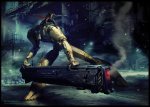


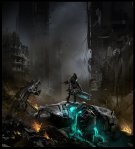









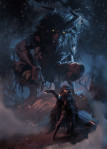




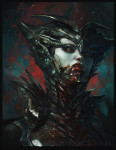
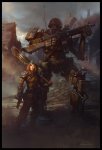
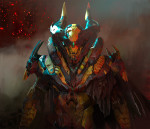
May 13, 2020
(Fiction) Appearances
[image error]
The town looked as if it had been bombarded from space. A black tarp was draped over the gaping hole in the side of a barbershop that dated from the early 1900s, according to the sign. Someone had been carting away the pile of fallen bricks with a wheelbarrow, which was now filled with snow. A block away, the windows of the Dollar-SavR had been replaced with plywood. The last row of spaces in its parking lot had cracked and fallen into the adjacent drainage ravine. A leafless tree had uprooted in a snow-covered city park, leaving a three-meter crater in the ground as it fell and crumpled the metal siding of a sheet rock supplier.
Nio watched from the window of the bus as it passed the park and turned right. Its tires carved valleys in the slush as it pulled to a stop near a boxy 24-hour diner. The engine rumbled gently as the conductor announced a thirty-minute stop for those continuing to Jamestown. Nio lifted the strap of her rolled bag over her shoulder and stepped down with unlaced boots. Her breath billowed over the nose-high collar of her puffy coat, and she huddled into it for warmth. It was the fourth day of record-setting April cold. It was expected to last another four.
The few townspeople that had ventured outside looked like they were preparing for a hurricane. The sidewalk display at the hardware store was being pulled from the ice and brought inside. Next to it, a handwritten A-frame placard had been left in front of an old-style pharmacy: Closing early for Moving Day. A similar announcement was posted to the door of the diner.
Nio pulled out her phone as a white-bearded man hurried past her on his way to the bathroom. The last message she received had simply said Please. She scrolled through the thread and made sure she knew where she was going. She had neglected to bring gloves and the air bit at her fingers, just as it was doing to her ears. She tapped a grayed icon at the top of the screen. Nothing. There was no encrypted coverage in the little town, which meant her untraceable phone had no service. From here on out, she was committed.
No one had spread salt at the corner and the sidewalk was pockmarked in frozen footprints, like the fossil of prehistoric riverbed. Nio nearly slipped when she saw the hair salon across the street. A fishing boat, likely from the dealer next door, hung inverted from the edge of the roof.
“Not something you see every day, huh?”
A tall, dark-skinned man, likely of mixed African descent, called to her from the front of the hardware store where he was loading large bags of fertilizer into the back of an old pickup truck. He was smart enough to wear gloves and a heavy mechanic’s body suit.
“Where you from?” he asked as she walked past.
“I don’t look like I’m from here?” she said with a polite smile.
“That haircut would be enough,” he said, nodding to her recently shaved head. “Aren’t you cold?”
“Eh,” she said, shivering as she walked.
“But that jacket clinches it.”
Nio looked down at herself. The exterior of her knee-length puffy coat was a plain gunmetal gray, but the interior, visible only inside the high collar that circled her face, was bright orange.
“What’s wrong with my jacket?”
“Up here, we wear the hunter’s orange on the outside.” He nodded to a round-bellied man in a ball cap who was crossing the street near the end of the block. He wore a light hunter’s vest over a camo-print collared shirt.
“Well, it’s reversible,” she said. “I’ll keep that in mind.”
“You do that.” He tossed another bag with a grunt.
With no cell service, Nio had no map. She realized the setting sun, just falling under the clouds, was on the wrong side for her to be heading north and turned around.
“What happened here?” she asked, hoping to disguise her gaffe.
The man pointed down the road toward the horizon.
She hadn’t noticed it before. Now that she did, she wondered how she could’ve missed it.
“Seen one of those before?” the man asked, sliding another bag across the icy sidewalk.
“Only on TV.”
The banded deep core mining platform straddled the earth like a four-legged god. Its massive pillars and broad, sail-like protrusions caught the red of the setting sun.
“Deep crust miner. Pulls up rare metals. Stuff with funny names.” He grunted as he tossed the bag into the truck.
“Tantalum,” she said. “Ytterbium. Ferropericlase. Probably some others.”
The tall man stood straight and caught his breath. He looked to be in his 30s and in good shape. “You don’t look like a mining engineer.”
“What do they look like?”
“Usually got a lot more facial hair, for one. You work up there?” he asked skeptically.
“Nope. Never seen one before.”
Unlike its oceangoing cousins, which rose no more than a couple hundred feet in the air, the deep core miner was as tall as a skyscraper. But since it had the same proportions, the winds at altitude were a serious problem. Where an oil rig could be boxy and exposed, a deep-crust driller was louvered and aerodynamic, including two large adjustable metal sails that rose in parallel from its shell-like center mass. Red lights spaced evenly along their central masts blinked in alternating intervals.
“So you just know about funny metals?” he asked.
“I know about lots of things,” she said as she started backing away—in the correct direction this time. “Nice to meet you, Del.”
“How’d you—” He looked down at his padded work suit. The name Del was stitched in fancy blue letter inside a white oval on his chest.
“Good one,” he said. “You are sharp. More proof that you’re not from around here.” He threw another bag into the truck. “Here for the big show?”
“Show?” she asked, taking tiny steps to extricate herself.
“Moving day.” He nodded again to the platform. It looked like a mountain.
“They move that thing?”
“All 800,000 tons.”
“How?”
“Anti-gravity.”
“I thought the emitters were outlawed. Like chemical weapons.”
“They are. For people like you and me.” He hefted the last bag. The bed of the truck rattled as it landed on top of the others. “International mining conglomerates get special exceptions.”
Nio looked up and down the frozen street. Hardly anything traveled. “Is that why everyone’s packing up?”
“Yup. They say we’re not supposed to feel it down here, but we all get the letter anyway.”
“Letter?”
Del walked around to the front of the truck. He opened the glove compartment and several objects fell out, including a screwdriver and a pack of gum.
“This.”
Nio walked to the truck and unfolded a thin sheet of cleanly printed paper. The seal of the State of South Dakota sat proudly at the top. She read aloud.
“The purpose of this letter is to remind you that from 11:00 p.m. on April 23rd until 3:00 a.m. on the 24th, Central Daylight Time, the gravity in the vicinity of Long Lake will be reduced between sixty and eighty percent. Water and power service across Brown, Campbell, Corson, Dewey, Edmunds, Faulk, McPherson, Potter, and Walworth Counties will be suspended from 10:00 p.m. in the evening until such time as the region is deemed safe. No evacuations are ordered. However, the Long Lake area remains closed and you are urged to secure any loose belongings weighing under 30 lbs. and to remain indoors.”
“Can’t even be sure of the ground under our feet anymore,” he said.
She handed the letter back and he stuffed it into a pocket.
“There’s three of them.” He turned and pointed north in a clear effort to avoid staring at the six oval scars just barely visible under the flat stubble of her scalp. “One just across the border in North Dakota, one out west in the badlands, and that one, about fifty miles out.”
Nio ran a hand across her hair involuntarily. “It’s that far?”
“Takes an hour to drive. Ever since they came, there’ve been tremors. Couple weeks ago, we had the big one. Town’s not really built for it, which is why they’re moving it west.”
He pointed down a narrow side street to another collapsed wall. The hole was marked in caution tape. The unit had been emptied.
“Deaths?”
“Two.” He nodded. “Lotsa injuries. You sure you’re not here for the big show?” he asked skeptically. “Sometimes you can see the legs light up. Gotta stay up late, though.” He looked up at the overcast sky. “Wasn’t supposed to be this cold.”
“Sound riveting. But I’m not here for the big show.” She started backing away again.
“Good, then you’re free. How ’bout you let me buy you dinner?”
Nio smiled reflexively as her cheeks flushed. “Okay, that was pretty slick.”
“Come on,” he said, slamming the truck’s tail shut. “Otherwise I’m stuck with reruns of The Lowdown.”
“I’m glad I rate higher than reality TV.”
“So what do you say? Not counting anything with a drive-thru, you have your choice of two not entirely terrible restaurants.”
“A whole two?”
He shrugged. “Everybody else is closing.”
“It’s very flattering,” she said to the space between his boots.
“But?”
“I mean it. I’ve not actually been asked out in a very long time.”
“So say yes.”
“I can’t.” Nio started backing across the street again. “Maybe next time, cowboy.”
“At least let me give you a ride,” he called to her as he opened the driver’s side door. “It’s 12 below, in case you haven’t noticed, and getting colder as the sun goes down.” He blew fog to underscore the point.
“A ride?” she asked from the opposite sidewalk, her legs shivering slightly. “After shooting you down? Isn’t that like taking advantage?”
“How? This is Aberdeen. We’re at most five minutes from everywhere you could want to go. Besides, I get the better deal.”
“How’s that?”
He took off his dirt-tipped work gloves. “You’re the one who’s gotta ride with a guy who smells like fertilizer.”
Nio closed her eyes and felt his bioelectrics. The signal was weak at that distance, but the pattern was precise. Organized. He didn’t have the high-pitched urgency of a man on a violent or sexual prowl. He was calm. Curious. She could feel him modulating up and down evenly in a pattern common with athletes and soldiers—anyone in the habit of reacting quickly.
As usual, the modulation reminded her of a song.
“Strange magic,” she breathed. Electric Light Orchestra.
“What’s that?”
“Okay, cowboy. It’s a deal.”
He got behind the wheel and opened the passenger’s side door, which creaked. There was trash on the seat, papers and wrapper, which he tossed behind the seat. Nio picked up the objects that had fallen out of the glove compartment and he took them and tossed them in the back as well.
“Which way?” he asked.
“I think it’s straight actually. Toward the freeway.”
The engine started with a rumble and he backed into the road. “First time in a small town?”
“No . . .” she said hesitantly, settling her rolled bag on her lap. “Not exactly.”
“But?”
The traffic light turned yellow and he rolled through it. Almost no one was out. The streets were crisscrossed in slush.
“First time in this part of the world,” she explained.
“And?”
“I admit. It’s different than I expected.”
“What’d you expect? Rednecks and gun racks?”
She turned to see if he had one. Except for an old sticker in the corner, the rear windshield was bare. They passed a small boutique coffee shop on the right. A pair of young women were chatting at a table near the window. A sign in the window indicated they were closing early as well.
Del saw her looking. “We got all the comforts of home. Maybe it’s good to get out sometimes and away from . . . New York?” he guessed.
“New York?” She made a face. “I’ve been there once.”
“Chicago?” Del studied her appearance with a deep scowl. The long, two-tone jacket with the high collar, the shaved head, the metal loops in her ears. “Detroit.”
Nothing.
“You can’t tell me you’re from the West Coast. Not with that jacket.”
“What is it with you and my jacket?”
“Gimme a hint,” he said.
“That takes all the fun out of it.”
He laughed skeptically. “All right.”
They rode in silence for a moment.
“So what’s ferroperiscope or whatever?”
“It’s a kind of iron oxide.”
“Rust?”
Nio nodded. “Same as on your truck,” she joked.
“I’ll have you know this truck is a classic.”
“Uh-huh. Keep telling yourself that.”
He scowled. “You’re telling me two people died so they could mine rust?”
“Sort of . . . Iron oxide crystallizes at very high temperatures and pressures. We’re talking like hundreds of thousands of atmospheres.”
“Is that a lot?”
“The human body can handle, like, five. Deep in the earth’s crust, though, rust forms crystals similar to table salt. What’s interesting is that those crystals conduct in one orientation only. In any other direction, they’re actually a good insulator. That’s really important in certain applications of solid state physics like quantum electronics.”
There was a pause.
“Okay. I’ll bite. Why?”
“It’s not a big deal.”
“No, I wanna know what’s so important about that thing.”
“Well, quantum effects are ‘slippery.’ Sort of. Ytterbium ions, for example, are really good at sharing electrons via quantum tunneling—basically, teleporting electrons through other materials.”
“No shit?”
“Statistically, electrons can do that at any time, but they tend not to if there’s an easier option, like regular conductivity. So if you bind ytterbium ions to an enzyme—”
“An enzyme, like something organic?”
“Yeah. Similar to how hemoglobin binds iron. Then you put a single ion-enzyme complex inside tiny cellular cavities of ferropericlase crystals with walls three molecules thick, you can construct a circuit where you know when electrons move via tunneling and when they’re conducted classically. Biomechanical wafers like that, with ytterbium ion-complexes inside stacked crystalline layers, is how they construct the quantum matrices for the Shri-class intelligences.”
“So the stuff they’re mining up there goes to make AIs.”
“Well, probably not much. The number of AIs is controlled by treaty.”
“That’s what I thought.”
“No one really knows what the Chinese are doing, but I doubt they’re doing it with rare earths from North America. That would be a big deal.”
“So what are they using it for?”
“Some of it probably goes for research—designing the next class of AI. But the materials have other applications—large-scale data-transfer systems, for example, on the order of zettabytes or more, as well as—” She stopped. She smiled at the look on his face.
“You sure you’re not an engineer?”
“What about you, cowboy? Been here your whole life?”
“Mom moved us here from Minneapolis when I was in junior high. Had a chance at 1A ball.”
He saw the look on her face. “You don’t know what that is.”
She shook her head.
“Wow.” Del stopped at a red light. He leaned back to examine her again in mock study. “You’re really, really not from around here. Come on, you gotta tell me.”
“I grew up in Taiwan,” she explained, almost in apology.
“Taiwan?” At first he seemed perplexed, then skeptical, like there was a punchline coming. “You don’t look Chinese.”
“Neither do you.”
“You don’t have an accent.”
“It was an international school. All English. And there’s this thing called TV.” She paused. “I used to watch The Lowdown,” she said proudly.
“Do you also speak . . . whatever they speak in Taiwan?”
“Taiwanese.” She smiled again. “Yes. I do.”
He drove in silence for a moment. “I blew it, didn’t I?”
“Blew what?”
“You’re smart and know about geochemistry and shit and I don’t even know what folks speak in Taiwan.”
“I know very little about geochemistry. But you were right.” She pointed ahead. “Looks like we were five minutes from everywhere. This is me here.”
“The Cedars?”
Nio nodded, and Del slowed and pulled to a stop in front of three blocks of aging, early 21st-century apartments. Behind him, an even bigger truck gunned its engine and pulled around, spraying slush into the bed of Del’s truck and over the sidewalk, which someone had previously shoveled.
“Asshole.” Del leaned forward to study the complex through the windshield. A pile of planks and downed branches in the corner of the parking lot was topped in mounds of snow. “You got friends here or something?”
“Or something.” Nio opened the door and stepped down carefully.
“You sure I can’t interest you in a not-entirely-terrible dinner? This town’s gonna get really dead in a couple hours.”
“Why are you so worried about me?”
“How do you know I don’t wait by the bus stop to pick up girls?”
She smiled. “You don’t. Which makes me wonder.”
“You psychic, too?”
“Call it intuition. So what is it?”
He shrugged.
“Come on,” she urged. “I told you where I was from.”
Del exhaled slowly. He looked down the road. “I saw you get off the bus. People like you come out here, they’re one of two things: lost . . . or trouble.”
“Which one am I?”
“I was hopin’ lost. Why you think I offered the ride?”
Nio smiled. “See ya around, Del.”
She shut the door and stepped carefully up the snowy bank and down into the parking lot. She didn’t turn, but she heard the truck’s engine and the sound of the tires in the slush.
Her instructions had said 2A, a second floor apartment at the top of an open set of concrete stairs. Most of the units seemed empty. The building’s vertical siding was cracked and moldy at the base. The owner had masked the rest with ample applications of paint.
Nio knocked, and the light from the small circular viewer in the door dimmed. Aware she was being observed, she smiled weakly.
“Who is it?” a woman’s voice called.
“We spoke online. You asked for my help.”
There was a pause, and Nio closed her eyes again. There was little electrical interference on the landing, and she could feel a single surge on the other side of the door, like a turning spiral. Whoever she was, she was throwing off waves of nervous energy.
There Should Be Unicorns by The Flaming Lips.
“I told you I changed my mind.”
Nio held up her phone. “Yeah, I run Parfait. I don’t have a signal out here. Can I at least take a look?”
“Show me your ID,” the woman said.
“I don’t have any.”
“You’re lying.”
“Look, I came a long way because I thought we might be able to help each other.”
Nothing.
“Please.” Nio recited the word. “That’s what you said. Please. Just let me take a look. I just wanna help.”
She heard the rattle of several locks and the clink of several chains. The door opened to reveal a striking young woman with amethyst hair. Her sky-blue skin had just enough lavender to keep it from looking like a joke. Her eyes were solid fuchsia, as were her lips and long fingernails, and she had short, blunted devil horns in her forehead.
“Wow,” Nio said. “That’s legit.”
She pulled Nio in and shut the door. “Did anyone see you?”
“Other than the nice cowboy who gave me a lift, no.”
The blue woman looked out the viewer again, and Nio could see her tail, which moved.
It was a kind of semi-permanent cosplay. She was meant to be Gogo Ichigo, a digital persona popular with post-pubescent boys. Gogo, whose last name meant strawberry in Japanese, was a blue-skinned succubus that bounced around in revealing clothes as if oblivious to the effect it had on her fans. A movie had been released the previous year in which she fought crime with her sexual-occult powers. The young woman’s mod was completely realistic. She was certainly showing it off, even in the cold, with tight cutoff jeans, heeled knee-high red platform boots, and a tank top, not much larger than a bikini, that bulged around her smooth blue cleavage. Her arms were stuffed into a winter coat but she kept it off her shoulders, like she was perpetually about to disrobe.
For a moment, she rubbed her hands together like she wasn’t sure what to do.
“Hi,” Nio said.
“Becks in here.” She led Nio all of ten feet to the bedroom.
Other than a single lawn chair in the living area, there was no furniture in sight. A bare mattress that lay crooked on the bedroom floor. A young woman in jeans and no shirt lay on her stomach near a space heater. Empty bottles of water and used tissues clustered around her head. There was a purse and a small duffel in the corner and a lone winter coat hanging in the closet. Crystals had been laid in a spoke pattern in two arcs around her. A single large spire sat vertically on the floor by her head.
The woman was sweating profusely. Her pure white skin was snaked in dark veins. It looked like she was made of marble.
“That’s worse than the pictures you sent.” Nio unsnapped her jacket in one pull and unrolled her bag.
“What is that?”
“An army surplus medic’s kit.”
The young woman’s frosted blue-white eyes seemed to take no notice of the stranger near her.
“Are her eyes part of her mod or is that new?”
“It was part of her mod.”
“Same for the alabaster skin?”
“What’s that?”
“Skin that looks like porcelain.”
She nodded.
Turning human skin a primary color was easy. You simply injected the upper dermis with a CRISPR solution that caused the epidermal cells to express an otherwise harmless enzyme that acted on any of a number of naturally occurring carbon-rings—reducing them or adding a methyl group as necessary. But primary colors were loud and unsightly and people only used them to roleplay Star Trek aliens. Subtle secondary colors, like Gogo’s, required mixing. Vividness and opacity were achieved by including operons—genes that control the expression of other genes—in the modified DNA to regulate the amount of each coloration enzyme. In the blue girl’s case, it meant light methylation with the barest hint of hemoglobin reduction. It was a real art, largely developed by home modders, and easy to get wrong. The internet was full disaster pictures: kids with more ambition than sense who downloaded specs for someone else’s skin tone and turned themselves an awful shade of puke green just in time for prom.
“This is Becks,” the blue woman said nervously. “I’m Ticity.” She was rocking back and forth slightly on her red platform heels. “I . . . I didn’t know what else to do. When she started growing those things on her back, I just took her and ran. Raffe would kill us if we went to a hospital. Can you help her?”
The upper right side of the girl’s back was swollen in an oblong dome at least three inches high at the center. The tissue was riddled with several round translucent cysts, like giant fever blisters. The largest was in the center. Nio could see swathes of shadow inside but no discernible shape or pattern. On the left, surrounded by a pentagram of handwritten hexadecimals, a two-inch fleshy stub erupted from a round wrinkle over her scapula. It dangled white downy feathers like autumn leaves.
“Here.” Nio held up a surgical mask. “Put this on.”
“Why? What’s wrong?”
“Just a precaution. Looks like you guys might’ve downloaded a little something extra.”
“Like a virus?”
Nio slipped a mask over her face and latex gloves over her hands, then she inserted a needle into a rubber-topped glass vial.
“What is that?” Becks asked, eyeing the needle.
“It’s just saline. I wanna see if there’s a reaction first. This might hurt a little,” she told the girl on the bed, who didn’t respond.
Nio inserted the needle to one side of the cluster and the girl drew breath sharply. Her skin wasn’t soft. It crinkled like cartilage. Nio squeezed the plunger and injected the saline, but nothing happened. She removed the needle and felt the girl’s back.
Stiff.
“It’s calcifying her.”
“What does that mean?”
“It means the reason she’s not reacting to anything is not because she’s in a stupor.” Nio leaned close to the girl’s face. Her eyes were bright. They moved just slightly toward Nio. “Jesus . . .”
“What is it? What’s wrong?”
“It’s probably very painful and difficult for her to move.”
“You mean she’s awake! Oh my God!” Ticity covered her mouth.
“How long has she been stiff like this?”
“Since this morning.”
“Do you have any lotion?”
“In my purse,” she said excitedly. “A lot, actually. I need to keep my skin moist or it changes—”
“Get it. Is she on any medication?” Nio put the needle back in the bag and prepared another.
“I got her some oxy,” Ticity explained as she walked to the bare kitchen. “For the pain.”
“Did it work?”
“I don’t know. I think so.”
“Do you know if she has any allergies?”
When there was no answer, Nio turned. Ticity was staring at her friend and swaying back and forth. There was a large bottle of Cetaphil in her hand. She shook her head and wiped the tear that fell. The drop was luminescent, as were the pools under her eyes. If she were true to character, all of her bodily fluids would glow in the dark.
“What about drugs?”
“Black dust,” she said. “Last weekend. And weed. Almost every day.”
“Alcohol?”
“Not since last night. No, wait. Two nights ago.”
Nio cleaned the needle with an alcohol swab and prepared another injection.
“This is an anesthetic. You may feel a little sleepy in a moment,” she told the girl on the bed, “but I need you to try and stay awake, okay?”
The girl blinked slowly but otherwise seemed catatonic. Nio inserted the needle in several places around the cyst, injecting a little each time. The deep flesh was soft. The sequence must have altered the keratin in her epidermis, which didn’t harden until it dried at the surface.
The room was quiet as Nio waited for the anesthetic to take effect.
“Becks . . .” Nio repeated the name. “That short for something?”
“Beckham,” Ticity breathed.
“That’s pretty.”
“She’s so gorgeous. I—I didn’t know what else to do. I have money.” She pulled out a wad of bills from her jacket and held it out like it was the plague.
“We can talk about that later. As soon as she can move, we have to get her to a hospital. Can you put the lotion on her joints?”
Ticity didn’t move.
“What’s wrong?”
“No hospitals.”
“We can’t leave her like this.”
“You said you could fix her!”
“I said I could help! She needs to go to a hospital. They can sequence an anti-retro-viral.”
Nio poked Beckham’s skin several times with a stiff finger. There was no response, which suggested the anesthetic had worked. She dug in her bag for an aspiration needle, which came in two pieces. She screwed the long metal tip onto the injector.
“What are you doing?”
“I need to drain the cysts, get whatever is in there out of her.”
There was a loud blow on the door, powerful enough to nearly break the locks, and Ticity jumped back. A chain fell loose and dangled over the wood. A second blow immediately followed the first. Nio stood.
The third broke it down.
A large man in a trenchcoat and high-laced boots appeared in the bedroom doorway. What remained of his once-blond hair poked up from his scalp like cactus needles. His neck was covered in tattoos of writhing octopus tentacles, like he had a mane of them. There was another man behind him. He looked Native.
The first man looked at Ticity. “That’s the problem with being blue, beautiful. Everywhere you go, people notice you.”
He had a deep Scottish accent. He touched her hair and she pulled away.
Nio was trapped by the second man in the door. He was smaller than the first but still quite a bit larger than her. Both were armed.
“Who’s this?” the big man asked.
“Just a friend.”
“Is that right?” He looked at the unrolled medic’s bag on the floor. “What kind of friend wears a coat like that?”
He picked it up and squeezed it between his bulging hands, feeling for contents. He pulled her phone from a side pocket and made sure it was off. He put it in his own pocket. Then he pulled out a small bottle of pills. He rattled them.
“I get headaches,” Nio explained.
He glanced at the scars just visible under her buzzed scalp and patted the coat more. He pulled out an official-looking letter, unopened. Nio had taken it to read on the bus but hadn’t found the courage.
“That’s private,” she said.
The big man replaced the letter and threw the coat at her. Then he pointed at the white woman.
“Take her to the ranch,” he ordered the second man. “I’ll bring these two to Raffe.” He smiled at Ticity. “Time to go, beautiful.”
She paused for the briefest of moment before complying without argument. She didn’t even look at her friend on the bed, as if she were already gone.
“It’s cold outside,” the big man told Nio. “Better put that fancy coat on.”
She paused and felt his bioelectrics—a staccato shriek.
Shingles by Frantic Frenetic.
A sleek luxury sedan waited in the parking lot. The sun had set. Only a distant glow remained at the horizon.
Ticity opened the passenger’s side door but stopped and turned. “Mr. Dalrymple, if you just let me—”
“Stop,” he ordered. “Tell it to Raffe.” He put a giant hand on Nio’s shoulder, like they were old pals. “Get in.”
Dalrymple opened the door as the second man carried Beckham out the door. He had wrapped her in his hunting coat.
“No rideshares,” Dalrymple called. “They have back seat cameras.”
The second man stopped. “Then what am I supposed to do?”
“Call Carl. He’s not working doors tonight.”
“What do I do until he gets here?”
“Wait, asshole.”
The second man bleated in protest and walked back inside with the young woman.
Nio thought about running while the men spoke. The man called Dalrymple seemed to sense it and tightened his grip.
“Get in,” he repeated.
Nio complied. She scooted over as Dalrymple got in right behind her. Sitting directly behind Ticity, he had quick access to either woman. The driver’s seat was empty. The car would drive itself.
“I’m sorry,” Ticity breathed.
revised first chapter from the new book, part of the project I’ve been calling Science Crimes Division, although that will not be the title
cover image by Andrey Kamenetskiy
May 11, 2020
(Art) The Dream Palette of Wenjun Lin
May 8, 2020
(Art) The Technomancers of Wouter Gort
[image error]
Dutch production artist and illustrator Wouter Gort continues to be an influence on my writing, particularly my novel-in-progress, first in a planned series called Science Crimes Division. Perhaps I’ll hire him to draw the graphic adaptation someday.
Find more by the artist on his ArtStation page.
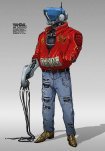

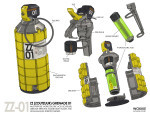
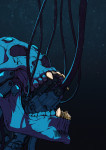





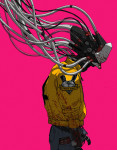
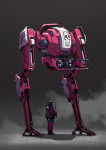

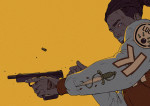


May 7, 2020
May 6, 2020
(Fiction) Holograms
[image error]
The ImagiNext corporate campus clustered around a striated vertical white spire that towered like the mast of an alien sailing ship over the nearby homes and apartment blocks. As Agent Quinn drove past row after row of late 20th century tract housing, Nio could feel the distant magnetic tug from the spire grow increasingly insistent. By the time Agent Quinn’s credentials got them past the guarded gate and into the parking garage, the magnetic field that radiated from the tower completely obliterated all others, and the sensors implanted under Nio’s skull droned at her insistently. She grimaced as she got out of the car. She took her pills from her pocket and swallowed two.
Quinn heard the rattle. “Those are new.”
“Hospital. And no, I didn’t steal them.” She held up the bottle to show him the label. “See? There’s my name.”
“I didn’t say you did.”
“But you were thinking it.”
He smiled.
The main building was clean and starkly white and everything was polished to a high shine. They were greeted and asked to sign an electronic log and then to wait while Quinn’s identity was verified with the Bureau, which took only moments. As Nio passed through one of the glass-and-steel security stalls, she noticed the phones on the circular security desk on the far side, which was also an information hub for visitors. Whatever machinery caused the single, droning EMP surge also irregularly interrupted cell phone signals, and the company conveniently provided its guests with landlines in case of trouble.
A completely bald man, the head of physical security it seemed, met them inside and shook their hands. He explained that the boss was with investors from overseas and asked that they wait in the rotunda, a perfectly round glossy white room at the center of which was a matching globular sculpture. Curved windows on one side looked out on a small garden courtyard with a white pebble floor. The rest of the wall was lined in white placards, each depicting in artistic relief some “miracle” the company was working on. They were spaced apart, leaving ample room for more.
“And what was the name again?” the smartly-dressed head of security asked.
“Agent Quinn of the FBI and Nio Tesla.”
“Tesla. Got it. We had Monroe in a few months back,” he said as he walked away.
“Monroe?” Quinn asked Nio when the doors were closed.
She was scowling at the crudely lava-esque white sculpture. “Manda.” The spherelike top rested just underneath the wide, recessed circular lighting in the ceiling.
“The model?”
“You know her?”
“Just pictures. Celebrity gossip.”
Nio smiled wryly. “I didn’t realize you were into fashion.”
“I never realized the connection. I guess I should have with the name.”
“None of us like to make a big deal out of it. It just invites a reaction.”
Agent Quinn strolled to the window. “Nice zen garden.”
“It’s fake.”
He scowled. “What are you talking about?”
“It’s a projection. There’s nothing there. It’s just a special screen.”
He stepped back. “Nooo . . .” He said skeptically.
Nio walked to one of the placards opposite the “window” and touched it. Immediately, the circular lighting dimmed and the image changed. A dark-haired woman with bright red lipstick was talking as if to a camera. She was dressed in an expensive ladies suit.
“That’s her,” Nio said.
Like Sol, Chancery looked older than Nio remembered. She was a businesswoman now, and a successful one.
ImagiNext billed itself as a technology company, but to date its only commercial success was in pharmaceuticals. Rather than investing in genomics research, as every other pharma company had, ImagiNext targeted the manufacturing process. Using programmable bacteria, the company brewed organic chemicals extremely cheaply. Where traditional chemical plants required expensive precursor compounds, which also had to be manufactured, ImagiNext’s giant vats of specially engineered bacteria could be fed for free—or nearly. They consumed biological waste, much of it human sewage, and converted it with evolutionary efficiency into whatever drug they had been genetically programmed to make. From poop to medicine. And they did it all with almost no human supervision. ImagiNext could churn out industrial quantities of chemicals for mere pennies.
The company was successful and flush with cash, but with maximal efficiency reached and competitors entering the marketplace, the company’s stockholders naturally wanted to know what the founder was going to do next. Reclamation, he told them. Since human waste contains trace amounts of gold, silver, and several increasingly rare metals that the world sorely needed, his plan was to upgrade his bacteria and to extend their use to landfills. Despite a coordinated campaign touting the clear environmental benefits of such an investment, the project was expected to lose money for several years, and afterward only to be weakly profitable, despite that it would change the world.
Used to the massive profits that came from the disruption of pharmaceutical manufacturing, the company’s major shareholders were unimpressed and ousted the man from the company he created and replaced him with Chancery Brontë, whose work with artificial intelligence at Google had earned her a reputation. The new boss quickly raised drug prices everywhere the company had driven out competition. She then fired most of the company’s scientists, changed its name to ImagiNext, and recruited top thinkers in the field of quantum computing. The move extended her reputation for being “bold and dynamic.” Everyone was waiting to see if she could add “successful” to the list. If so, she’d quickly find herself being courted by the top 100.
On the screen, she described how the company was developing “scatter displays” like the one Nio and Quinn were watching.
“—by simply squeezing more and more pixels onto a 2D surface. Our scatter displays are different. They exist somewhere between those older technologies and full 3D holograms, which are bulky, requiring a box full of magnetically movable particles. In fact, what we call a hologram these days is not a hologram at all since it’s three-dimensional. A hologram is the recording of an interference pattern such that a higher-dimensional image is recorded on a lower-dimensional surface. Real holograms should be two-dimensional, and yet look completely real.
“It turns out the cues your brain uses to decide whether an image is real are explicable. We see in stereo, so the first of these clues is parallax, or how objects seem to move relative to an observer in space. As you walk down the street, the sidewalk under your feet changes position quickly, whereas the skyscraper at the horizon doesn’t move at all. That happens at a small scale just with objects on a desk. Turn your head and the wires behind your monitor appear to change position at different rates relative to it and each other. We’re not always consciously aware of that, but our brains are.
“After that, a certain amount of randomness is required. Our brains have learned that the real world has ‘noise’—scratches on a computer casing, the tiny dead spider in the window track, the scuff on the wall from where your chair occasionally hits it, right down to the pattern of dust on the legs of your monitor. That’s all information. We don’t think of it this way, but I’ve just described the history of your office, encoded in its objects and patterns. Computing all of that to complete realism requires as much information as there is in the world, or nearly. Normally, those calculations are costly and time-consuming, even with a supercomputer. We here at ImagiNext can do it—or something very close—with quantum computing, which is why we moved our headquarters to Fermilab, the world leader in neutrino research.
“A normal computer processes instructions strictly. You can’t ask it to make anything up. It can only compute an output based on the rules it was given. But in conjunction with some special kinds of algorithms, what are called ‘non-conformal’ algorithms, a quantum computer can generate the kinds of noise we see in the world. It can also approximate the holographic effect inside a crystal, such as a thin pane of tempered glass, giving us the ability to create images nearly indistinguishable from reality, at least to the casual observer.
“For example, I never actually gave this interview. I was never filmed sitting here. There are no clothes like the ones I appear to be wearing. I wrote these words and emailed them to our technicians, who trained the machine on video footage of me. It captured my speech patterns and movements. Everything else about this was completely fabrica—”
Nio touched another placard and the image changed again. The same woman was standing before a peaceful scene.
“What if we could detect cancer years before it appeared, simply by breathing into a tube? What if teachers could identify children with learning disabilities just by having them press their thumbs onto a screen? What if an app you carry on your phone could listen to a salesperson’s voice and tell you if they were lying? These are the kinds of revolutionary questions we’re asking as part of our groundbreaking Social Dimensions Initiative, a partnership with the US Department of Health and Human Services. The project aims to quantify as never before the complete range of human—”
The image stopped and the lights rose the moment the double doors opened again. The garden reappeared as a sharply dressed, dark-haired woman who looked to be nearing 30 stepped into the rotunda wearing a colorful Chanel suit and matching accessories. It was the woman from the screen. She held a tablet, which she handed to a guard, who took it and stepped away. In the foyer beyond the doors, a group of about ten sharply-dressed business people of mixed races and gender milled as if waiting for their next meeting.
The doors shut with a clatter, and the sound echoed disconcertingly.
“We really must do something about the noise,” the woman said as she approached. She had a faint British accent. Her two-toned suit pants swished as she walked. “This was supposed to be a room of quiet reflection.”
Or a church to you, Nio thought. “The doors still have to pass the fire code,” she suggested out loud.
The two women stood twenty feet from each other and stared. Nio instinctively concentrated on Chancery’s bioelectric field, but there was nothing. Just the constant tug from the tower.
“Goodness,” Chancery said. “It’s really you.”
“Still rockin the fake accent, I see.”
Chancery rolled her eyes. “Same ol’ Nix.”
“Nix?” Agent Quinn asked.
“That’s what they used to call me,” Nio said.
“That’s what we still call her,” Chancery told him. “Or we would if she hadn’t disappeared.” She stepped forward and held out her hand. “Chancery Brontë. How are you?”
Quinn took it. “Ms. Brontë.”
“I’m afraid you’ve caught me completely by surprise. But then, something tells me that was intentional. I don’t suppose you’re working for Vogue these days,” she joked sarcastically.
“How are things with the Brontë Society?” Nio asked. “They still declaring war?”
“Oh my God.” She shut her eyes. “I cannot deal with those people. They will not let up. Apparently I’m not doing anything right! Did you know I’ve sued them for harassment?” she told Agent Quinn. “I’ve explained to them how disrespectful they are to her memory. Charlotte could’ve been anything she wanted, but in that time, women could be professional authors and little else. They couldn’t even own property! In different circumstances, she would’ve been Prime Minister.”
“I’m sure.”
Chancery stopped. She gave Nio a wry look. “Ah, haha. Nice try. But I really do have to be going. If today goes well, we could triple our revenue in five years.” Her shoes clicked on the floor. “Lovely to see you, but please, please make an appointment next time. My assistant can set something up.”
“Hold up, Miss,” Agent Quinn called. “We really just have a few questions.”
“Oh, I’m sure you do,” she mocked. Her lipstick stretched into a smile. “Unfortunately, I can’t help you.”
“Sol called you,” Nio said.
“Yes, and I already told the FBI everything I know. It was a very short conversation. I’m sure you have the notes.”
“You’re lying,” Nio said.
Chancery’s jaw set. “What?”
“You’re lying, Chaz.” Nio turned to Quinn. “That what we called her. She gets that flippant ‘oh-it’s-no-big-deal’ attitude when she’s lying. Otherwise everything she talks about is super important. The most important thing ever. I’m sure it works on most people. If you act like something’s not a big deal, they’ll treat it that way, right?”
“Goodbye Niobi.”
“He always loved you. That’s why he called you and not Leo or Max.”
Chaz stopped again.
“You broke his heart. Now you’re gonna piss on it, too?”
“Fuck you.” Chaz turned. “You weren’t even at the funeral. You were the only one not there.”
“If you’re not free to talk here,” Agent Quinn interjected, “I’d be happy to take you to the FBI office downtown. It’s not far.”
“Was that a threat?” Chancery’s lips pursed in shock.
“No, I—”
“You can shake your mock authority like a spear all you want, Mr. Baggy Suit. It doesn’t change anything.”
“Excuse me?”
“I’m not obliged to talk to you—now or ever. Unless you’re going to arrest me for something. Good luck with that. Otherwise, I suggest you find my secretary and make an appointment. Goodbye.”
She turned again to go.
“Buy me a few alone?” Nio asked Agent Quinn softly as they both strode after her.
“Will I regret it?”
“Versus losing your job?”
“Excuse me,” he called, trotting forward with an extended hand. “You’re right, of course, Ms. Brontë. Let me sincerely apologize”—he took her hand in his—“for whatever is about to happen.”
“What?”
Agent Quinn moved through the door ahead of Chancery and shut it behind him. She stormed forward and tried the handle, but it was either locked or he was holding it.
“Ohhhhhoho,” she grumbled menacingly as she took out her phone. Her manicured thumb clicked furiously on the screen. “I am going to have your badge, Agent Whoever-You-Are. This is kidnapping. And you”—she looked to Nio—“are going back to prison.”
Nio slapped the phone down. It bounced once and the screen cracked.
Chaz’s mouth went wide with shock. “Are you insane?”
“You always said so.” Nio grabbed the woman’s neck in a throw hold and rolled her to the floor.
Chaz shrieked and landed hard. She touched her nose and looked at it, checking for blood. “What the fuck is wrong with you?”
She started to get up, but Nio pushed her back down and climbed on top of her, holding Chaz’s arms down with her knees and putting a hand over her mouth.
“I know you’re not scared of me, Chaz. I don’t have the lawyers for it. But you have to ask yourself something: if I don’t get what I want—five stinkin’ minutes of your time—am I crazy enough to beat my head against this trash corporate art until I’m bloody and nearly unconscious, and then to call Agent Quinn and tell him you assaulted me? Because if I did, then as a matter of procedure, he’d have to arrest you. In front of your guests. I don’t have the resources to threaten you. But the government does. They have a whole giant apparatus set up to handle exactly this sort of thing. I’m told it turns very, very slowly. You and I both know you have the lawyers to beat the charge. But what will your investors think when there’s smears of blood all over your perfect white walls? Think of the time and money and bad press that could’ve been saved if only you’d—”
“Alright!” she screamed. She pushed Nio up. “Alright. Fine.”
Nio stood.
“Same ol’ Nix,” Chaz accused. She stood up and dusted off her Chanel. “Always what you want.”
“No, Chaz. That’s you. I’m here for Sol.”
“Yes!” Chancery admitted with flourish.
“Yes, what?”
“Sol was upset on the phone. More upset than I’d ever seen him. He kept—kept asking how many of us there were.”
“What do you mean?”
“He kept saying, were there twelve or thirteen?”
Nio scowled. “Twelve?”
“That’s what I said! And he made me name us all, and when I finished, he said what about absinthe?”
“Like the drink?”
Chaz nodded.
“And then?”
“And that was it. He said it was all fake.”
“What was?”
“Everything. He said literally everything was fake, and that’s when I told him he should go to a hospital. And he barked at me.”
“Barked?”
“I don’t know what to call it! It was so unlike him. In this gruff tone, he said ‘They wouldn’t understand!’ So I said I’d come. I didn’t know what else to do. He said don’t bother, like it meant nothing, and hung up. But I checked my calendar and sent him an invite anyway. For dinner. I was going to be in New York in a couple weeks for work. I texted him to make sure he saw the invite but didn’t hear anything. The next day, I got an automatic response saying he’d accepted, so I thought I’d see him then and we’d work through whatever needed to be worked through. I’m not evil, you know.”
“No?” Nio asked. “Then why didn’t you call someone in New York to check on him, if he was that upset? I’ll tell you why. Because you couldn’t be bothered. You didn’t actually care, and you knew that would be obvious to anyone, which is why you told the FBI—”
“Weeks had passed! Do you fucking get that? It’s not like I was a suspect. I was two thousand miles away in a glass-walled office in clear view of two-dozen people. I only found out when the FBI fucking ambushed me at our appointment. I had no idea he was even missing. By that time, whatever had happened to him had already happened. What good would it have—”
“You didn’t call or text or—”
“You haven’t had a lot of experience, Nix—Che doesn’t count—so maybe you don’t realize it, but men don’t like to appear weak. Sometimes you have to give them space.”
Nio shook her head in disbelief.
“Oh shut up,” Chaz said. “You were always so patronizing. Even in school. ‘Look at me, I hate everything and dress in black. I’m so cool.’ You would’ve done the same thing in my shoes. The difference is, you have nothing, so you risk nothing.”
“The difference is,” Nio corrected, “I would never wear your ugly frickin shoes. But speaking of fire codes, you got a back door to this place?”
“Door? But . . .” Chancery turned toward the front, toward the door Agent Quinn was blocking. She glanced down to the bracelet peeking out from under Nio’s pant leg. Chaz rolled her eyes. “God. I should’ve known. You’re such a child.”
“Well?” Nio asked.
“Yes. The fire exit is there.”
She pointed at a panel in the wall near the curved window. The large round room was made to hold talks and receptions. If it were full of people, there would need to be another exit. It was as large as a double door but rested flush with the frame, disguising its function. It was unlocked and attached to a counterweight such that turning it open was extraordinarily easy. It swung on a center pivot, creating two passages, an entrance and an exit, one on each side.
“Kidnapping, huh?” Nio said.
“Just please GO.”
“Chaz,” Nio called a second later.
“That’s all I know!” The woman objected from the opposite door.
“Not that. After . . . what happened, you know, I got checked. I got everything checked. You should too.”
“What does that even mean?”
“Have you ever asked yourself: how come none of us have any kids?” Nio paused. “Not even the guys.”
Chancery’s anger faded to confusion. Then her face was blank.
“You should get checked,” Nio said. Then she trotted down the staircase and toward the front door.
rough cut from my WIP, Science Crimes Division
cover image “Techunter” by Aedel Fakhrie
May 4, 2020
(Art) Dave Cooper’s Repellent Sexual Surrealism [NSFW]
The Comics Journal recently posted their review of Dave Cooper’s new book, “Mudbite,” which they described as “abject fantasias of intense sexual anxiety rendered in Cooper’s compellingly repellent style.” I think that about sums it up.
I’m fascinated by Cooper because he’s part of a new wave of artists who don’t inhabit a singular defined space. Cooper isn’t a “comic artist” as that phrase is usually applied. He doesn’t make either serials or graphic novels. His books are sexual surrealism stretched in time.
Nor is he a fine artist who slums it to make comic books. Just as Ta-Nehisi Coates used his recent MacArthur Fellowship not to write a sequel to “Between My Country and Me,” but instead to take a run on Black Panther, so Cooper not only produces comics, but also showcases paintings in galleries and it’s that depth of style — where his comics are not slimmer versions of his art but but fully realized and executed visions themselves — that makes his work so compelling.
From the review: “Eddy Table is the obvious common denominator, but Cooper’s foils dominate here. These foils are giantesses, wobbly women of Amazonian proportions that readily recall R. Crumb’s phantasies or Otto Dix’s muses.” (See also Namio Harukawa, from an earlier post on this blog.)
“And yet the setting is all Eddy. Indeed, there’s no real separating the material world from the mental milieux in Mudbite. Cooper’s primary stage is the psychosphere. We’re in Eddy’s head the whole time, and Cooper uses this setting to show not only how our dreams can tip into nightmares, but also how our nightmares can enthrall us. We like to poke around in that horror sometimes, even as other impulses prompt us to flee.”
[image error] [image error]
More of Cooper’s art:



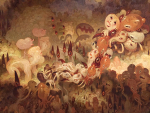
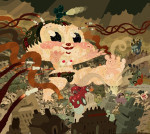




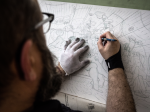
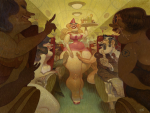




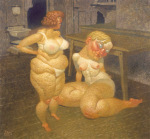



May 3, 2020
(Art) The Fluid Fantasy of Jeffrey Catherine Jones
[image error]
Jeffrey Catherine Jones was an American artist and illustrator best known for her book covers across numerous genres in both prose and comics. Born male, she originally achieved notoriety as “Jeff Jones” and was hailed by fantasy artist Frank Frazetta as “the greatest living painter.” Following the difficult and ultimately costly decision to undergo hormone replacement therapy in 1998, she changed her name to Jeffrey Catherine Jones. She died in 2011, aged 67, leaving behind a vast body of work.






